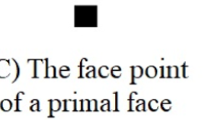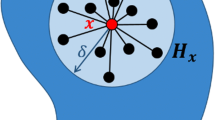Abstract
We propose an arbitrary-order accurate mimetic finite difference (MFD) method for the approximation of time-dependent diffusion problems in mixed form on unstructured polygonal and polyhedral meshes. The method of lines (MOL) is used to combine spatial and temporal discretizations. The spatial scheme requires the definition of a high-order approximation of the divergence and gradient operators and the two inner products for the discrete analogs of fluxes and scalar unknowns. The discrete divergence and gradient operators are built according to a discrete duality relation. The inner product for the flux grid functions is built by explicitly imposing the conditions of consistency and stability. The family of semi-discrete mimetic methods is proved theoretically to be energy-stable as the corresponding continuous problem. Then, a full discretization is derived by combining via MOL the MFD method of order k with time marching schemes from the backward differentiation formula of order \(k+2\). Optimal order of accuracy is demonstrated for the scalar variable and verified numerically by solving the time-dependent diffusion problems with a variable diffusion tensor for k from 0 to 3 on three different unstructured mesh families.


Similar content being viewed by others
Change history
16 August 2019
We propose.
References
Shashkov, M., Steinberg, S.: Support-operator finite-difference algorithms for general elliptic problems. J. Comput. Phys. 118(1), 131–151 (1995). https://doi.org/10.1006/jcph.1995.1085
Shashkov, M.: Conservative Finite-Difference Methods on General Grids. CRC Press, Boca Raton (1996)
Beirão da Veiga, L., Lipnikov, K., Manzini, G.: The Mimetic Finite Difference Method, MS&A. Modeling, Simulations and Applications, vol. 11, I edn. Springer, Berlin (2014)
Brezzi, F., Lipnikov, K., Shashkov, M.: Convergence of the mimetic finite difference method for diffusion problems on polyhedral meshes. SIAM J. Numer. Anal. 43(5), 1872–1896 (2005)
Brezzi, F., Lipnikov, K., Shashkov, M.: Convergence of mimetic finite difference method for diffusion problems on polyhedral meshes with curved faces. Math. Models Methods Appl. Sci. 16(2), 275–297 (2006)
Brezzi, F., Lipnikov, K., Shashkov, M., Simoncini, V.: A new discretization methodology for diffusion problems on generalized polyhedral meshes. Comput. Methods Appl. Mech. Eng. 196(37–40), 3682–3692 (2007)
Brezzi, F., Lipnikov, K., Simoncini, V.: A family of mimetic finite difference methods on polygonal and polyhedral meshes. Math. Models Methods Appl. Sci. 15(10), 1533–1551 (2005)
Manzini, G., Lipnikov, K., Moulton, J.D., Shashkov, M.: Convergence analysis of the mimetic finite difference method for elliptic problems with staggered discretizations of diffusion coefficients. SIAM J. Numer. Anal. 55(6), 2956–2981 (2017). https://doi.org/10.1137/16M1108479
Gyrya, V., Lipnikov, K., Manzini, G.: The arbitrary order mixed mimetic finite difference method for the diffusion equation. ESAIM: Math. Modell. Numer. Anal. 50(3), 851–877 (2016)
Lipnikov, K., Manzini, G., Moulton, J.D., Shashkov, M.: The mimetic finite difference method for elliptic and parabolic problems with a staggered discretization of diffusion coefficient. J. Comput. Phys. 305, 111–126 (2016). https://doi.org/10.1016/j.jcp.2015.10.031
Beirão da Veiga, L., Manzini, G., Putti, M.: Post-processing of solution and flux for the nodal mimetic finite difference method. Numer. Methods PDEs 31(1), 336–363 (2015)
Lipnikov, K., Manzini, G.: High-order mimetic method for unstructured polyhedral meshes. J. Comput. Phys. 272, 360–385 (2014)
Gyrya, V., Lipnikov, K., Manzini, G., Svyatskiy, D.: M-adaptation in the mimetic finite difference method. Math. Models Methods Appl. Sci. 24(8), 1621–1663 (2014)
Brezzi, F., Buffa, A., Manzini, G.: Mimetic inner products for discrete differential forms. J. Comput. Phys. 257–Part B, 1228–1259 (2014)
Beirão da Veiga, L., Lipnikov, K., Manzini, G.: Arbitrary order nodal mimetic discretizations of elliptic problems on polygonal meshes. SIAM J. Numer. Anal. 49(5), 1737–1760 (2011)
Lipnikov, K., Manzini, G., Svyatskiy, D.: Analysis of the monotonicity conditions in the mimetic finite difference method for elliptic problems. J. Comput. Phys. 230(7), 2620–2642 (2011)
Cangiani, A., Gardini, F., Manzini, G.: Convergence of the mimetic finite difference method for eigenvalue problems in mixed form. Comput. Methods Appl. Mech. Eng. 200(9–12), 1150–1160 (2011). https://doi.org/10.1016/j.cma.2010.06.011
Lipnikov, K., Manzini, G., Brezzi, F., Buffa, A.: The mimetic finite difference method for 3D magnetostatics fields problems. J. Comput. Phys. 230(2), 305–328 (2011). https://doi.org/10.1016/j.jcp.2010.09.007
Beirão da Veiga, L., Droniou, J., Manzini, G.: A unified approach to handle convection term in finite volumes and mimetic discretization methods for elliptic problems. IMA J. Numer. Anal. 31(4), 1357–1401 (2011)
Beirão da Veiga, L., Lipnikov, K., Manzini, G.: Error analysis for a mimetic discretization of the steady Stokes problem on polyhedral meshes. SIAM J. Numer. Anal. 48(4), 1419–1443 (2010). https://doi.org/10.1137/090757411
Beirão da Veiga, L., Gyrya, V., Lipnikov, K., Manzini, G.: Mimetic finite difference method for the Stokes problem on polygonal meshes. J. Comput. Phys. 228(19), 7215–7232 (2009). 10.1016/j.jcp.2009.06.034
Beirão da Veiga, L., Lipnikov, K., Manzini, G.: Convergence analysis of the high-order mimetic finite difference method. Numerische Mathematik 113(3), 325–356 (2009). https://doi.org/10.1007/s00211-009-0234-6
Cangiani, A., Manzini, G., Russo, A.: Convergence analysis of a mimetic finite difference method for elliptic problems. SIAM J. Numer. Anal. 47(4), 2612–2637 (2009). https://doi.org/10.1137/080717560
Cangiani, A., Manzini, G.: Flux reconstruction and solution post-processing in mimetic finite difference methods. Comput. Methods Appl. Mech. Eng. 197(9–12), 933–945 (2008). https://doi.org/10.1016/j.cma.2007.09.019
Beirão da Veiga, L., Manzini, G.: A higher-order formulation of the mimetic finite difference method. SIAM J. Sci. Comput. 31(1), 732–760 (2008)
Beirão da Veiga, L., Manzini, G.: An a-posteriori error estimator for the mimetic finite difference approximation of elliptic problems. Int. J. Numer. Methods Eng. 76(11), 1696–1723 (2008). https://doi.org/10.1002/nme.2377
Antonietti, P.F., Bigoni, N., Verani, M.: Mimetic discretizations of elliptic control problems. J. Sci. Comput. 56(1), 14–27 (2013)
Antonietti, P.F., Beirão da Veiga, L., Verani, M.: A mimetic discretization of elliptic obstacle problems. Math. Comp. 82(283), 1379–1400 (2013)
Antonietti, P.F., Beirão da Veiga, L., Bigoni, N., Verani, M.: Mimetic finite differences for nonlinear and control problems. Math. Models Methods Appl. Sci. 24(8), 1457–1493 (2014)
Antonietti, P.F., Formaggia, L., Scotti, A., Verani, M., Verzott, N.: Mimetic finite difference approximation of flows in fractured porous media. ESAIM Math. Model. Numer. Anal. 50(3), 809–832 (2016)
Antonietti, P.F., Beirão da Veiga, L., Lovadina, C., Verani, M.: Hierarchical a posteriori error estimators for the mimetic discretization of elliptic problems. SIAM J. Numer. Anal. 51(1), 654–675 (2013)
Antonietti, P.F., Bigoni, N., Verani, M.: Mimetic finite difference approximation of quasilinear elliptic problems. Calcolo 52(1), 45–67 (2015)
Lipnikov, K., Manzini, G., Shashkov, M.: Mimetic finite difference method. J. Computational Physics 257–Part B, 1163–1227 (2014). Review paper
Lipnikov, K., Manzini, G.: Discretization of mixed formulations of elliptic problems on polyhedral meshes. In: Barrenechea, G.R., Brezzi, F., Cangiani, A., Georgoulis, E.H. (eds.) Building Bridges: Connections and Challenges in Modern Approaches to Numerical Partial Differential Equations. Lecture Notes in Computational Science and Engineering, vol. 114, pp. 309–340. Springer, Berlin (2016)
Wachspress, E.: A Rational Finite Element Basis. Academic Press, Cambridge (1975)
Sukumar, N., Tabarraei, A.: Conforming polygonal finite elements. Int. J. Numer. Meth. Eng. 61(12), 2045–2066 (2004)
Droniou, J.: Finite volume schemes for diffusion equations: introduction to and review of modern methods. Math. Models Methods Appl. Sci. 24(08), 1575–1619 (2014)
Di Pietro, D.A., Ern, A.: Hybrid high-order methods for variable diffusion problems on general meshes. Comptes Rendus Mathématique 353, 31–34 (2014)
Cangiani, A., Dong, Z., Georgoulis, E.H., Houston, P.: hp-Version Discontinuous Galerkin Methods on Polygonal and Polyhedral Meshes. SpringerBriefs in Mathematics. Springer, Berlin (2017)
Di Pietro, D.A., Ern, A.: Mathematical Aspects of Discontinuous Galerkin Methods. Mathématiques et Applications. Springer, Berlin (2011)
Cangiani, A., Georgoulis, E.H., Houston, P.: \(hp\)-Version discontinuous Galerkin methods on polygonal and polyhedral meshes. Math. Models Methods Appl. Sci. 24(10), 2009–2041 (2014)
Cockburn, B., Gopalakrishnan, J., Lazarov, R.: Unified hybridization of discontinuous Galerkin, mixed, and continuous Galerkin methods for second order elliptic problems. SIAM J. Numer. Anal. 47(2), 1319–1365 (2009)
Wang, J., Ye, X.: A weak Galerkin mixed finite element method for second order elliptic problems. Math. Comput. 83, 2101–2126 (2014)
Beirão da Veiga, L., Brezzi, F., Cangiani, A., Manzini, G., Marini, L.D., Russo, A.: Basic principles of virtual element methods. Math. Models Methods Appl. Sci. 23, 119–214 (2013)
Manzini, G., Russo, A., Sukumar, N.: New perspectives on polygonal and polyhedral finite element methods. Math. Models Methods Appl. Sci. 24(8), 1665–1699 (2014)
Di Pietro, D.A., Droniou, J., Manzini, G.: Discontinuous skeletal gradient discretisation methods on polytopal meshes. J. Comput. Phys. 355, 397–425 (2018). https://doi.org/10.1016/j.jcp.2017.11.018
Süli, E., Mayers, D.F.: An Introduction to Numerical Analysis. Cambridge University Press, Cambridge (2003)
Evans, C.L.: Partial Differential Equations, Graduate Studies in Mathematics, vol. 19. AMS, Providence (1998)
Boffi, D., Brezzi, F., Fortin, M.: Mixed Finite Element Methods and Applications. Springer Series in Computational Mathematics. Springer, Berlin (2013)
Johnson, C., Thomee, V.: Error estimates for some mixed finite element methods for parabolic type problems. ESAIM: Math. Modell. Numer. Anal.- Modélisation Mathématique et Analyse Numérique 15(1), 41–78 (1981)
Boffi, D., Gastaldi, L.: Analysis of finite element approximation of evolution problems in mixed form. SIAM J. Numer. Anal. 42(4), 1502–1526 (2004)
Bause, M., Radu, F.A., Köcher, U.: Error analysis for discretizations of parabolic problems using continuous finite elements in time and mixed finite elements in space. Numer. Math. 137(4), 773–818 (2017)
Gao, H., Qiu, W.: Error analysis of mixed finite element methods for nonlinear parabolic equations. J. Sci. Comput. 77(3), 1660–1678 (2018)
Acknowledgements
This work was partially supported by the Laboratory Directed Research and Development program (LDRD), under the auspices of the National Nuclear Security Administration of the U.S. Department of Energy (DOE) at Los Alamos National Laboratory operated by Los Alamos National Security LLC under Contract No. DE-AC52-06NA25396, and the Advanced Scientific Computing Research (ASCR) Program in Applied Mathematics of the DOE Office of Science. The University of Padova “Project SID-2016- Approximation and discretization of PDEs on Manifolds for Environmental Modeling” is also acknowledged.
Author information
Authors and Affiliations
Corresponding author
Additional information
Publisher's Note
Springer Nature remains neutral with regard to jurisdictional claims in published maps and institutional affiliations.
The original version of this article was revised: equation formatting and reference tagging errors have been corrected.
About this article
Cite this article
Manzini, G., Maguolo, G. & Putti, M. The High-Order Mixed Mimetic Finite Difference Method for Time-Dependent Diffusion Problems. J Sci Comput 80, 1805–1830 (2019). https://doi.org/10.1007/s10915-019-01002-4
Received:
Revised:
Accepted:
Published:
Issue Date:
DOI: https://doi.org/10.1007/s10915-019-01002-4
Keywords
- Mimetic finite difference method
- Polygonal mesh
- High-order discretization
- Time-dependent diffusion problem
- Mixed formulation




